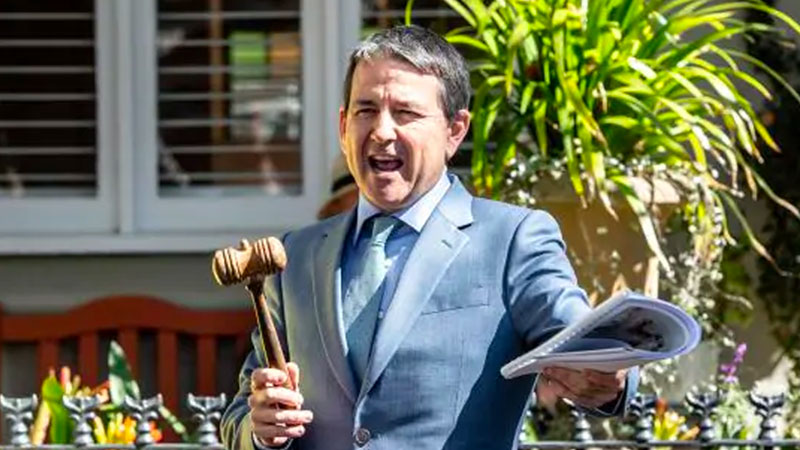Caution Urged as House Prices Start to Fall
As the social distancing ban on home auctions and viewings starts to bite, the message to both buyers and sellers is not to panic.
But the latest auction market preview—handed down amid the federal government's latest round of restrictions—paints a sobering picture of the outlook for residential property prices.
With 3,065 capital city properties scheduled to go under the hammer, Corelogic analysts originally predicted the week ending 29 March would be the busiest of the year for auctions.
Despite the real estate industry's quick adaptation to social distancing measures, Corelogic now predicts a number of vendors will withdraw their property from the market completely, or postpone until circumstances improve.
"After the weekend, we should have a better idea on how this is going to impact the auction market going forward."
And despite strong momentum in the housing market in recent months—the latest results consistent with house price growth of around 5 per cent year-on-year, according to macroeconomic research group Capital Economics—further restrictions on “non-essential services” could include a ban on buying and selling real estate, which would further impact home sales.
And even when the Covid-19 outbreak is over, the outlook is still far from clear, according to Capital Economics senior economist Marcel Thiellant.
“Even once restrictions to prevent the spread of coronavirus come to an end, we suspect that rising unemployment and tightening bank lending conditions will result in weak housing demand and falling house prices."
Thiellant suggests that looking at how Australian residential property has fared against negative economic shocks in the past helps shed some light on the impact of the current slowdown on property.
“House prices were broadly flat in nominal terms during the recessions of the early-1980s and early-1990s, though they fell in real terms.”
“And while they kept rising throughout the shallow economic downturn triggered by the bursting of the dotcom bubble, they fell at least initially during the global financial crisis and during the period when Australia’s mining boom turned to bust.
"Given that inflation is now much lower than it was during the 1980s and early 90s, we think that those latter episodes will provide a better guide for what is to come,” Thiellant said.
Unemployment rates are also a key indicator of Australia’s prospects for recovery from the “coronavirus recession” for AMP Capital chief economist Shane Oliver.
“A relatively short recession that sees unemployment rise to around 7.5 per cent would likely only set prices back around 5 per cent or so, after which prices would bounce back,” Oliver said.
“But a deeper recession with, say, 10 per cent unemployment, risks tripping up the underlying vulnerability of the housing market around high prices and high debt levels. This could see a 20 per cent fall in prices.”
Oliver said the latter scenario highlights the need for the government and the RBA to minimise the fallout from coronavirus shutdowns in terms of businesses and jobs.
Property analyst Terry Ryder said that Australia’s property market has outridden major economic downturns before and will again, and the anticipated “short, sharp downturn” could pay off for those prepared to act when others are pausing for thought.
Speaking at this week’s “coronavirus – threat or opportunity” webinar, Ryder said that fear about future economic certainty was understandable, but both investors and owners needed to remember property was a long-term game.
“It is a time to be looking for opportunities, when others are perhaps intimated and sitting on the fence,” Ryder said, adding that government financial stimulus and flexibility from banks during the coronavirus shutdown would help cushion the property market from any significant blows.
Ryder predicts that while any reduction in market activity as a result of changes to the way Australians interact in the market would not necessarily result in a significant reduction in prices.
“One of things that is happening is vendors are already not listing their properties for sale at the same levels they were a year ago and two years ago - and I think that is going to be exacerbated by the virus crisis,” Ryder said.
“We are still going to have demand, but have relatively few properties for sale and that will help to put a floor under property values.”

Buyers' agent Veronica Morgan said that lessons could be learned from the global financial crisis, when “otherwise sane” people succumbed to catastrophic thinking and knee jerk sales prevented them from re-entering key markets.
“At my agency we never recommend buying property with a short-term focus—nor do we recommend knee-jerk selling,” Morgan said, adding that even if there is a market downturn, history is on our side.
“When fear takes hold, unfortunately otherwise sane people fall for catastrophic thinking declaring, ‘that’s it, now the market’s now going to plummet 40 per cent’. Property bears have been trotting this figure out whenever there’s been a bad sign for the last couple of decades,” Morgan said.
“But things never actually pan out in that way—people still need homes. Life as we know it may change a bit, but it will nevertheless go on."
Likewise, buyers' agent Rich Harvey said investors needed to be prepared to buy before the market bounded back - and those who were struggling should talk to their bank about getting a better rate to refinance or taking a mortgage payment holiday.
“Don’t panic - it is not the time to sell the family home. Stay the course and talk to your bank about holding on," Harvey said.
“We will get through the crisis.”
















